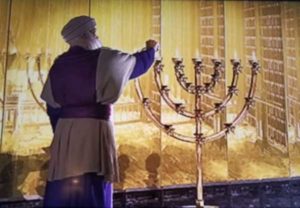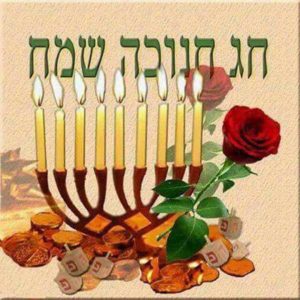Hanukkah is mentioned in the New Testament, John 10:22-23: “Now it was the Feast of Dedication in Jerusalem, and it was winter. And Jesus walked in the temple…”
The story of Hanukkah begins with the reign of the Syrian rulers from the dynasty of the Seleucids who followed the Greek/Hellenistic lifestyle. After the death of Alexander the Great, the Greek Empire was divided into four kingdoms; the Syrian Seleucid kingdom was one of them (see also prophecies of Daniel 11).
The Syrian/Greek rulers tried to force Hellenism on the Jews living in Israel. Hellenists emphasized outward human beauty and the worship of the physical body, whereas Jews emphasized inner spirituality and morality, as the God of Israel commanded. Unfortunately, there were many Jews who adopted Hellenism and turned away from the God of Israel.
In 174 B.C.E, Antiochus IV took over the reign of the larger Syrian/Greek kingdom. He was a cruel tyrant, contemptuous of the Jewish religion and the worship of their invisible God. He proclaimed himself a god by calling himself Epiphanies— meaning “manifestation of a divine or supernatural being.”
Desiring to unify his kingdom through a common religion and culture, Antiochus Epiphanies tried to eliminate the unique relationship of the Jewish people with the God of Israel by abolishing all the Commandments of God to the Jewish people. He removed the righteous High Priest, Yochanan, who opposed the influence of the Jewish Hellenists and their Greek/Syrian customs. He was later assassinated and replaced by a series of corrupt so-called High Priests, who were favorable to Hellenism.
Antiochus, in his rage and hatred of the Jews, sent his armies into Jerusalem. The Holy Temple was invaded, desecrated and plundered. Antiochus arrogantly entered into the temple and took the silver and gold, the precious vessels that were in the temple, and the hidden treasures which he found. He issued a series of harsh decrees against the Jews, forbidding Jewish worship; sacrifices and atonement according to the Law of God, Sabbath rest and the celebrations of the Jewish holidays. Learning and teaching Torah was forbidden and Torah scrolls (which contain the first 5 books of the Bible) were confiscated and burned, circumcision and the dietary laws were prohibited under penalty of death.
An unclean pig, forbidden by Jewish law was sacrificed on God’s Holy Altar. The Temple was dedicated to the worship of Zeus Olympus. An altar to Zeus was set up on the high altar, and the Jews were forced to bow before it under penalty of death.
Many Jews were massacred for refusing to eat pork that was forced on them by Antiochus’s servants, who went from town to town and from village to village to force the citizens to worship pagan gods. Jews who refused were whipped with rods and their bodies were torn to pieces. Some were crucified while they were still alive. Male babies who were found to be circumcised were killed and their bodies hung on their mother’s necks, which caused the death of the mothers. Torah books that were found were destroyed and their owners killed. Jews who survived the massacre were heavily taxed.
However, there were many Jews who complied with the king’s commands either voluntarily, or out of fear of the penalty.
Mattityahu and the Maccabees
Mattityahu was an old priest who lived in the village of Modiin with his 5 sons. They were all God fearing and loyal to the covenant of the God of Israel, obeying His commandments.
One day Syrian officers built an altar to the Greek gods in the marketplace of the village and demanded that Mattityahu offer sacrifices to the foreign gods. Mattityahu refused, and when one of the Hellenistic Jews approached the altar to offer a sacrifice, Mattityahu killed him, and also a Syrian officer, with his sword. Together with his sons, they chased away the rest of the Syrian officers and destroyed the altar.
Mattityahu, together with his sons, his friends and many who were zealous for God and His laws and answered His call to follow Him, left the village of Modiin and fled to the hills of Judea to escape the fury of Antiochus. They formed a small guerrilla army and from time to time left their hiding places to attack enemy outposts, and to destroy the pagan altars.
Before his death, Mattityahu appointed his son Judah to be the commander of the fighting force against the oppressing Syrian/Greeks.
Judah the Maccabee
Judah was called “Maccabee,” a word composed of the initial letters of the four Hebrew words Mi Kamocha Ba’eilim YHWH, “Who is like You, O God.” Exodus 15:11.) Maccabee also means “hammer” in Hebrew. Judah’s attacks were hard as a hammer.
Antiochus sent his Generals to wipe out Judah and his followers, the Maccabees. The great and better-equipped army of wicked Syria/Greek soldiers came against the small Jewish Maccabees army, determined to destroy the rebellious Jews. When the Jews saw the size and strength of the enemy’s army, they said to Judas: How can we, being few and less equipped, fight against such a great and strong army?
Judah answered them:
“Fear not their multitude, for the success of war is not in the multitude of the army, but strength comes from heaven. The Lord himself will overthrow them before us.”
As soon as he finished speaking, he attacked suddenly and destroyed the Syrian army, killing many of them, and the rest fled. Fear of Judah and his brothers the Maccabees fell upon the nations around them, as they heard the stories of Judah’s victories.
When Antiochus heard about the defeat of his soldiers, he was enraged. He ordered a powerful larger army consisting of more than 40,000 men and 7,000 horsemen to go into the land of Judah and to destroy the small Maccabean army. The great Greek army commanders were sure they could defeat Judah and his Maccabees. Merchants from the nations who heard of the battle were also sure of the Jews defeat and came with large quantities of silver and gold ready to buy the children of Israel for slaves.
Judah and his brothers, zealous to defend the Holy Temple and willing to fight unto death, gathered in Mitzpah, which was a place of prayer (where Samuel, the prophet of old, had offered prayers to God) to prepare for battle; and to pray, and ask mercy and compassion. They fasted that day, and put on sackcloth and ashes upon their heads, renting their garments and they cried with a loud voice to God in heaven:
“For your holies are trodden down, and are profaned… The nations are coming together against us with the intent to destroy us. How can we stand up to them, unless you, O God, help us?”
Judah appointed captains over the people. He ordered the builders of houses, the newlyweds, the planters of vineyards, and all who were fearful, to go back home. And the remaining army left the camp in Mitzpah and camped on the south side of Emmaus.
The next day, Judah arrived for battle with only 3,000 men. When they saw the size and strength of the enemy’s army, Judah prayed to God and said:
“Blessed are you, O Savior of Israel, you destroyed the fierce and mighty giant by the hand of your servant David… Now give up this army into the hands of your people Israel, let their army and horsemen be confounded. Strike them with fear, cause the boldness of their strength to vanish. Cast them down with the sword of the ones who love you, and let all that know Your Name, praise You with hymns.”
Then Judah turned to his men and said: “Fear not their multitude, neither be afraid of their assault. Remember how our fathers were saved in the Red Sea when Pharaoh pursued them with a great army. And now let us cry to heaven, and the Lord will have mercy on us, and will remember the covenant of our fathers, and will destroy this army before us this day. And all nations shall know that there is One that redeems and delivers Israel.” Then they sounded with trumpets, and cried out with a loud voice, and went out to fight the enemy who wanted to destroy them. The bold Maccabees were ready to either live or die bravely.
Thousands of the Syrian soldiers fell in the battle, and the rest fled from fear of the Jews. Then Judah and his men set fire to the enemy’s camp, and the remaining Syrian soldiers were struck with great fear and fled.
Judah and the Maccabees returned to the camp to take the spoils. They got a lot of gold, silver, and great riches. Returning home they thanked the Lord for the great victory He gave them by singing a song from the psalms; bless the Lord for He is good, His mercy endures forever.
Hanukkat HaBait – The Dedication of the Temple
When the victorious Maccabees entered Jerusalem and the Holy Temple, they saw the place desecrated, the sanctuary desolate, and the altar profaned from the idol worshipping. Judah chose God-fearing priests who started to cleanse the holy places. They rebuilt the Temple and restored its interior, and repaired the Temple courts.
They renewed the sacred vessels and the lampstand and brought the altar of incense and the table into the Temple. They burnt incense on the altar and lit the lamps on the lamp-stand to shine within the Temple and they put the Bread of the Presence on the table and hung the curtains.
They destroyed the altar that had been defiled and built a new one from uncut stones according to God’s instructions in the Torah and offered a sacrifice according to the law of God upon the new altar.

On the twenty-fifth of the month of Kislev in the year 3622, (164 BC), the temple was rededicated with music and celebration. And all the people fell upon their faces and worshiped God. The joyous celebration of the dedication of the altar lasted for eight days, in memory of the feast of Tabernacles they were forbidden to celebrate. Judah, and his brothers, and the people of Israel decreed that this day of the dedication of the altar (Hanukkah in Hebrew) would be celebrated every year for eight days starting on the twenty-fifth day of the month of Kislev, with joy and gladness. (Kislev is corresponding, approximately, to early December in the Gregorian calendar.)
The Legend of the Miracle of the Small Container of Oil

This legend, which does not appear in the historical account in the book of the Maccabees, was written in the Talmud (Oral law) by Jewish sages in the 3rd century AD. It tells of the event of the cleansing of the Temple before the dedication, that the Maccabees looked for oil to light the lamps on the Menorah (lamp-stand) but found only a small container of pure olive oil bearing the seal of the High Priest Yochanan. The oil was sufficient to burn only for one day. By a miracle of God, it continued to burn for eight days, until new oil was made available. The story of the oil miracle has been retold for generations to give the holiday a more spiritual meaning in addition to giving thanks for the miracle of the restoration of the Holy Temple.